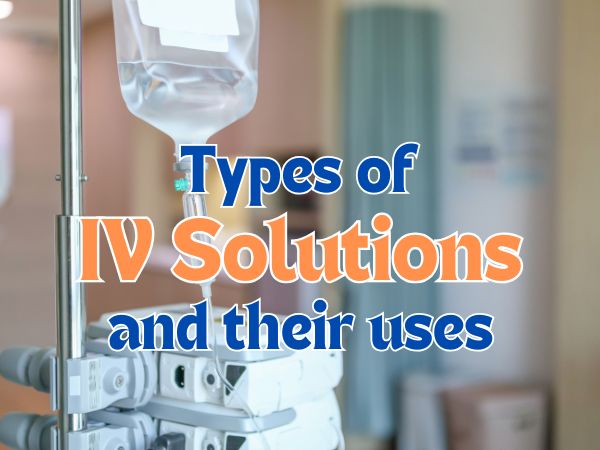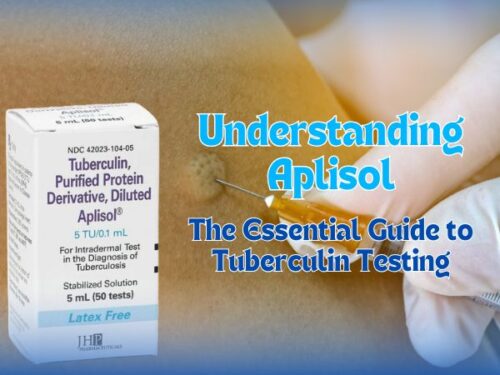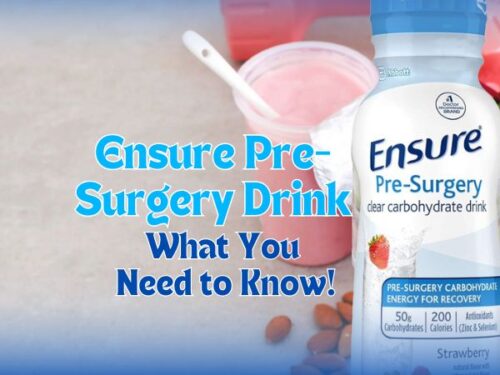Types of IV Solutions and Their Uses
Intravenous or IV administration transfers fluids directly into the blood plasma via the venous route. These fluids either carry medications or nutrients that the body needs. The applications of IV solutions are many as these are often employed during surgeries as well as for the management of severe dehydration. In addition, electrolyte imbalance can also be restored with their use. Owing to their vast usage, many different types of IV solutions are available which serve different purposes.
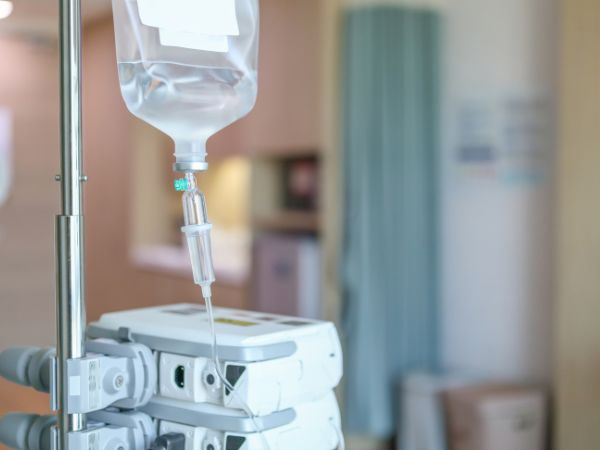
Different types of IV solutions are necessary in healthcare facilities
In this article, let us go through some of the commonly employed types of IV solutions along with their uses. In addition, some of the products from notable brands of IV solutions have also been enlisted.
Types of IV Solutions and their Uses
The following are the different types of IV solutions along with their uses:
Normal Saline
Normal saline (NS) is a solution which contains 0.9% sodium chloride (NaCl) in aqueous solution. It is sterile in nature which means it is 100% free from microbes. The sodium chloride present in the solution dissociates in the body and generates sodium and chloride ions which then regulate the hemostatic balance.
Uses
Normal saline isotonic solutions are probably the most commonly used IV solutions. It is useful in the following conditions:
- Normal saline is effective for the management of severe dehydration.
- The patients who are suffering from vomiting and diarrhea are administered with normal saline for replenishment of water and salts in the body.
- It is also useful during blood transfusion as it can help maintain the overall blood volume.
- Normal saline is also employed for fluid resuscitation during hemorrhaging.
- Conditions like hyponatremia i.e. lower than normal concentration of sodium in the body can be easily dealt with by administering normal saline.
- The administration of normal saline can also make up for the gastrointestinal suctioning losses.
- Normal saline can also be used during hemodialysis as a priming solution.
Special Considerations
Despite its several uses, patients on normal saline drips should be monitored for hypervolemia or fluid volume overload. This condition can be dangerous for patients with a history of heart failure or kidney failure.
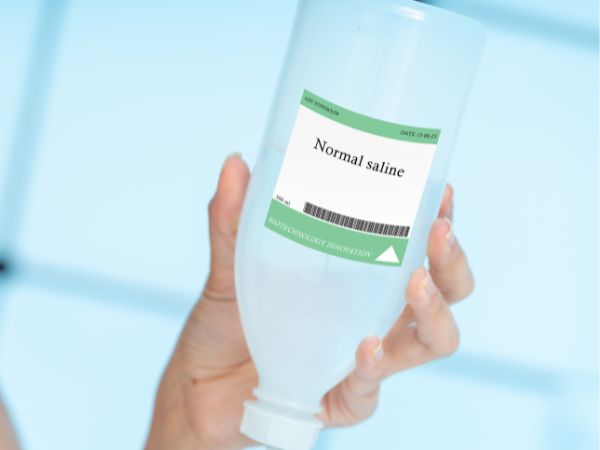
Normal saline (NS)
Dextrose Water
Among different types of IV solutions, dextrose water solution is an isotonic fluid in the body. It is often abbreviated as D5W because of having 5% dextrose in water. As dextrose is another name for glucose, the solution only contains this as a solute along with water as a vehicle. As soon as the solution is injected, dextrose starts metabolizing and the nature of the solution changes to hypotonic i.e. with relatively lesser solute concentration.
Uses
The following are the cases in which the employment of D5W isotonic solutions is beneficial:
- D5W facilitates the excretion of solutes from the kidneys by providing free water to the water.
- This is also effective for the management of hypernatremia which refers to a state of having too much salt (sodium chloride) in the body.
- The dextrose solution is also employed for diluting the plasma electrolyte concentrations.
Special Considerations
D5W should never be used for fluid resuscitation as it becomes hypotonic after metabolism causing the fluid to leave the intravascular space. As a result, the risk of swelling in the brain region elevates. Therefore, the patients should be watched for the symptoms of cerebral edema. As D5W can also cause hypovolemia i.e. lowered fluid level in the body, it should not be used in patients with burns, trauma, or liver diseases.
Lactated Ringer’s Solution
Lactated Ringer’s solution (LR), also known as Ringer’s lactate solution, is an aqueous solution prepared with sodium chloride, sodium lactate, and potassium chloride along with calcium chloride.
Uses
Lactated Ringer’s solution is effective in the management of many medical conditions which include the following:
- IV therapy based on Ringer’s lactate solution is ideal for fluid resuscitation, especially in patients with burns or trauma.
- It is often employed during surgical procedures for the management of gastrointestinal fluid losses.
- Lactated Ringer’s solution can be administered as a therapy against metabolic acidosis as it can help manage high acid levels in the body which are often associated with infectious diseases.
- LR is also given during labor as it can help speed up uterine muscle dilation. As a result, the delivery becomes quick and easy.
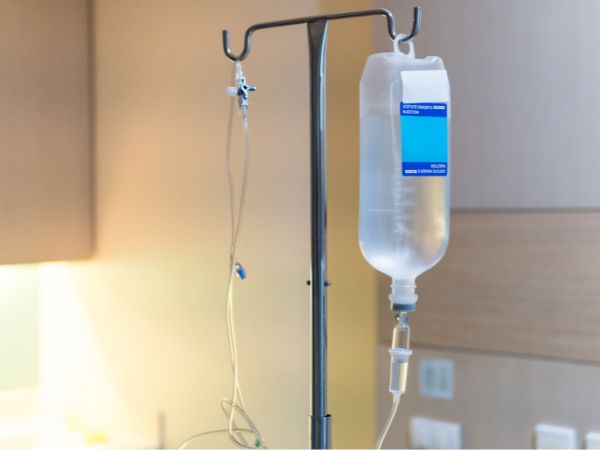
Dextrose water 5% is employed for various purposes in healthcare facilities
Special Considerations
Generally, the lactated Ringer’s solution is well-tolerated in most patients and does not cause issues. However, some patients may experience swelling due to fluid buildup in the body. Moreover, while administering Ringer’s solution, potassium levels should be kept in check in case the patient has a history of renal disease.
It should also be kept in mind that the lactated Ringer’s solution is not suitable for individuals who have a history of:
- Congestive heart failure (CHF)
- Chronic renal disease
- Hypoalbuminemia i.e. a state of having lower albumin protein in the blood
- Cirrhosis i.e. scarred liver tissue
In addition, lactated Ringer’s solution should not be administered in cases when the pH value of the serum is above 7.5. This is because the solution will make the body even more alkaline thus worsening the alkalosis.
Sodium Chloride Solution 0.45%
0.45% NaCl solution is one of the different types of IV solutions which are just like normal saline in composition but differ on the basis of the amount of the salt added into the aqueous base. However, unlike normal saline, these are hypotonic solutions.
Uses
The uses of 0.45% NaCl solution (half normal saline) include:
- The 0.45% sodium chloride solution is effective against intracellular dehydration.
- This IV fluid therapy can also effectively treat hypernatremia or elevated sodium levels in the body.
- The solution can also be administered to assist the excretion of salts from the kidneys.
Special Considerations
Patients who have low fluid volume ( hypovolemia ) or low blood pressure (hypotension) should be closely watched when given 0.45% sodium chloride solution. It is also not suitable for patients with burns, trauma, as well as liver diseases as it can worsen hypovolemia. Moreover, the patients should be watched for cerebral edema.
Total Parenteral Nutrition
Total parenteral nutrition of TPN is a method that is used to administer nutrients to a person via an intravenous route. This technique is employed when the patient cannot consume food orally either due to an injury, surgical procedure, or because of being in a state of coma. Premature children are also given TPN to help them gain some weight and strength.
Composition
These types of IV solutions are rich in basic nutrients which include:
- Carbohydrates which primarily include dextrose
- Fats used for providing the necessary calories
- Proteins as well as amino acids
- Minerals and electrolytes containing sodium, chloride, calcium, phosphorus, and magnesium
- Vitamins
However, the composition of TPN is not fixed and can be changed depending on the patient’s needs.
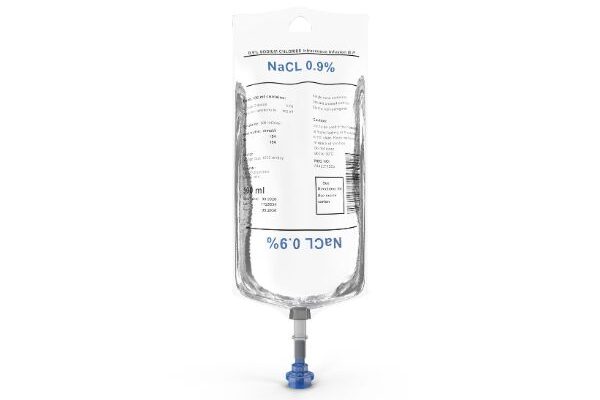
0.9% sodium chloride solution in an IV pack
Types of IV Solutions at Health Supply 770: Features and Specifications
IV solutions are essential in healthcare facilities in many ways. These can deliver drugs to the patients, nutrients, as well as necessary electrolytes that have been depleted due to the disease or trauma.
Various types of IV solutions are available in the market, serving different purposes and employed for multiple reasons. Below are the types of IV solutions offered by Health Supply 770, along with their features and purchase links:
B. Braun L8000 Replacement Preparation Sodium Chloride, Preservative Free 0.9% IV Solution Flexible Bag 1,000 mL 12 EA/CA
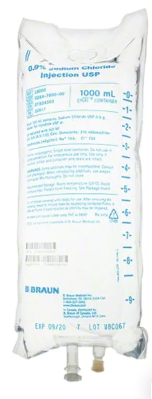
US$529.88
Product Details
Braun L8000 replacement preparation is a type of IV solution that contains sodium chloride as a solute. The concentration of the salt in the solution is 0.9% (0.9 grams of sodium chloride per 100 ml of solution or 9 grams of the solute per 1 liter of the solution) which makes it a normal saline solution. Apart from sodium chloride, these types of IV solutions do not contain any preservatives or additives.
Normal saline can either be administered on its own or can serve as a base for the administration of medications. For this purpose, drugs in the form of injections are injected into the normal saline. The B. Braun L8000 replacement preparation solution comes in flexible plastic bags which are free from latex and thus do not cause irritation to the patient.
B. Braun L5101 Dextrose Water 5% IV Fluids Flexible Bag 500 mL CS/24
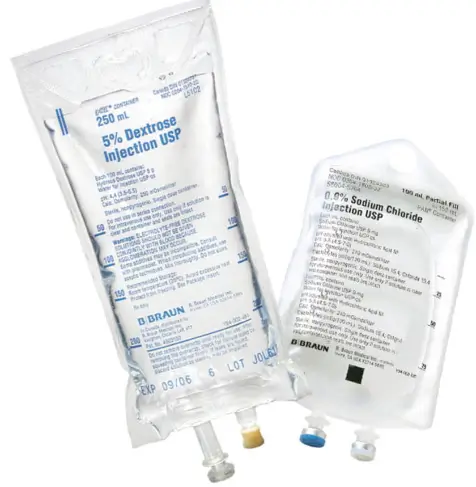
US$377.88
Product Details
Braun L5101 dextrose water 5% IV solution is a product that is prepared by the addition of 5 grams of dextrose (also called glucose) per 1000 ml of solution. The solution is often administered as a caloric agent because the glucose in it provides nutrition to the body.
Therefore, the IV fluid is ideal for balancing the sugar level in patients who have either fainted due to low BGL or are extremely dehydrated. In addition, if you feel dizzy and have frequent headaches, your doctor might recommend you get an IV infusion based on a dextrose water solution.
These types of IV solutions come in 500 ml plastic bags which are flexible and completely non-toxic. This way, there is no risk that you will receive any impurities along with the infusion.
B. Braun L7500: Lactated Ringer’s Solution IV 1000 mL CS/12
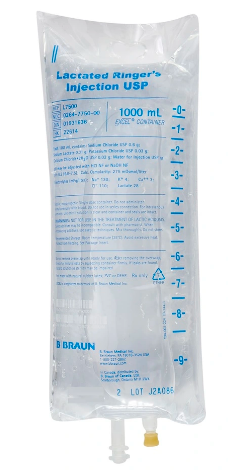
US$533.33
Product Details
- Braun L7500 lactated Ringer’s solution has sodium chloride, potassium chloride, as well as sodium lactate in it. Because of this composition, lactated Ringer’s solution has vast applications in healthcare. The product comes in a 1000 ml packaging and 12 such packs come in the above-mentioned price.
These types of IV solutions are sterile and microbe-free. This can be employed for the treatment of acidosis in the body as well as for the management of gastrointestinal issues. Moreover, lactated Ringer’s solution finds extensive application in gynecology as well where it is used to ease the delivery process by helping the uterus to dilate. In addition, the B. Braun L7500 lactated Ringer’s solution can be stored for longer as well.
Grifols 729620 IV Injection Solution Sodium Chloride 0.9% 500mL Bag 20 EA/CS
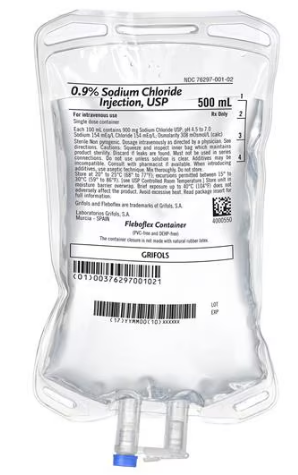
US$579.88
Product Details
Grifols 729620 IV injection solution is formulated with 0.9% sodium chloride as its chief electrolyte. These types of IV solutions are sterile and no preservative or additive is added to them apart from the electrolyte. The packaging of the product is non-PVC and is free from Di-(2-ethylhexyl) phthalate or DEHP which is a chemical agent often found in flexible plastics. In addition, there is no natural rubber latex in the plastic bottle of these IV fluids which is an irritant material and causes allergies.
*Note: The prices mentioned in the article are taken from our Health Supply 770 website. These may vary over time.
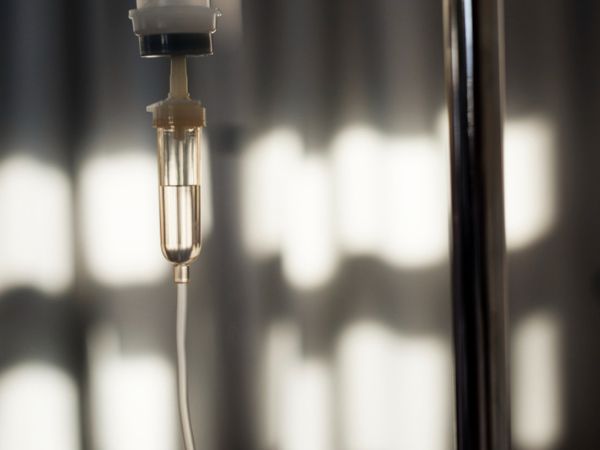
IV solutions are administered using an IV drip set
The different types of IV solutions mentioned in the article, along with many other medical supplies, can be ordered from Health Supply 770, a reliable name when it comes to medical products. They have a 30-day money-back guarantee and provide your products to you in the shortest possible time. Click the link given in the article to check out the different types of IV solutions.
Bottom Line
IV solutions are necessary during surgical as well as non-surgical procedures for different reasons. Their use in the management of dehydration, maintenance of blood volume as well as the treatment of nutritional deficiencies. Moreover, these types of IV fluids are also employed for electrolyte replenishment and thus regaining strength and vitality.
Different types of IV solutions are available in the market which include normal saline, D5W, and lactated Ringer’s solution among others. All of these have their own benefits and restraints which should be kept in mind while using them.
As their use is inevitable, it is good to keep a stock of these IV solutions in every healthcare facility. For purchasing the different types of IV solutions, reliable vendors like Health Supply 770 should be approached. They ensure the provision of quality products along with satisfactory services.
References
https://www.ncbi.nlm.nih.gov/books/NBK591820/table/ch15fluids.T.comparison_of_iv_solutions6/

PhD Scholar (Pharmaceutics), MPhil (Pharmaceutics), Pharm D, B. Sc.
Uzma Zafar is a dedicated and highly motivated pharmaceutical professional currently pursuing her PhD in Pharmaceutics at the Punjab University College of Pharmacy, University of the Punjab. With a comprehensive academic and research background, Uzma has consistently excelled in her studies, securing first division throughout her educational journey.
Uzma’s passion for the pharmaceutical field is evident from her active engagement during her Doctor of Pharmacy (Pharm.D) program, where she not only mastered industrial techniques and clinical case studies but also delved into marketing strategies and management skills.










